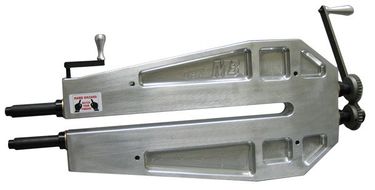Difference between revisions of "Bead Roller"
Jump to navigation
Jump to search
| Line 32: | Line 32: | ||
=== Rolling Steps === | === Rolling Steps === | ||
#Begin by tracing the area of your desired bead on the sheet metal. | #Begin by tracing the area of your desired bead on the sheet metal. | ||
| − | #Next | + | #Next, loosen the tensioning bolt, and place the sheet metal between the two forming dies. |
=== Maximum Capacity === | === Maximum Capacity === | ||
* 19 Ga (.040”) Mild Steel | * 19 Ga (.040”) Mild Steel | ||
* 16 Ga (.050”) Aluminum | * 16 Ga (.050”) Aluminum | ||
* 21 Ga (.035”) Stainless | * 21 Ga (.035”) Stainless | ||
Revision as of 13:19, 16 March 2019
A bead roller is a type of roller used for forming and reinforcing sheet metal. Sheet metal is rolled between two beads (or other dies) to give it extra strength and rigidity. The bead roller in the shop is the Mittler 210-24M.
The current Ace of the Bead Roller is Needed (Makerhub@georgefox.edu).
Documentation
Resources
- Video showing the bead rolling process.
Training
Rolling Steps
- Begin by tracing the area of your desired bead on the sheet metal.
- Next, loosen the tensioning bolt, and place the sheet metal between the two forming dies.
Maximum Capacity
- 19 Ga (.040”) Mild Steel
- 16 Ga (.050”) Aluminum
- 21 Ga (.035”) Stainless
